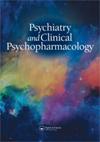Vitamin B12 and haemoglobin levels may be related with ADHD symptoms: a study in Turkish children with ADHD
IF 0.5
4区 医学
Q4 PHARMACOLOGY & PHARMACY
引用次数: 8
Abstract
ABSTRACT OBJECTIVE: In this study, we evaluated vitamin B12 and iron parameters in Turkish children with ADHD in order to examine the relationship between ADHD symptoms and these parameters. METHODS: Drug-naive 100 ADHD patients, aged between 6 and 12 years old, were included in the study. None of them had acute or chronic diseases. All patients were assessed by using the Schedule for Affective Disorders and Schizophrenia for School Age Children – Present and Lifetime Version (K-SADS-PL). Conners Parent Rating Scale (CPRS) was used for screening ADHD symptoms and symptom severity. Blood samples were evaluated for ferritin, haemoglobin, MCV, RDW, and vitamin B12 parameters. RESULTS: We indicated an inverse relationship between haemoglobin levels and learning, anxiety subscale scores of CPRS. Also, vitamin B12 and psychosomatic subscale scores were found negatively related whereas the relationship was in the opposite direction for ferritin. Vitamin B12 level was negatively correlated with learning problems and psychosomatic subscales of CTRS in the combined subtype of ADHD. CONCLUSION: Vitamin B12 and iron support may be useful in treatment of childhood ADHD, especially for learning problems, besides medication.维生素B12和血红蛋白水平可能与多动症症状有关:一项对土耳其多动症儿童的研究
摘要目的:在本研究中,我们评估了土耳其ADHD儿童的维生素B12和铁参数,以研究ADHD症状与这些参数之间的关系。方法:研究对象为100例6 ~ 12岁未接受药物治疗的ADHD患者。他们都没有急性或慢性疾病。所有患者均采用学龄儿童情感障碍和精神分裂症量表-现在和终生版(K-SADS-PL)进行评估。采用Conners父母评定量表(CPRS)筛选ADHD症状和症状严重程度。血液样本评估铁蛋白、血红蛋白、MCV、RDW和维生素B12参数。结果:我们发现血红蛋白水平与CPRS的学习、焦虑亚量表得分呈反比关系。此外,维生素B12和心身亚量表得分呈负相关,而铁蛋白则相反。维生素B12水平与ADHD合并亚型的学习问题和CTRS心身量表呈负相关。结论:除了药物治疗外,维生素B12和铁支持可能对治疗儿童多动症有用,特别是对学习问题。
本文章由计算机程序翻译,如有差异,请以英文原文为准。
求助全文
约1分钟内获得全文
求助全文
来源期刊

Psychiatry and Clinical Psychopharmacology
Medicine-Psychiatry and Mental Health
CiteScore
1.00
自引率
14.30%
发文量
0
期刊介绍:
Psychiatry and Clinical Psychopharmacology aims to reach a national and international audience and will accept submissions from authors worldwide. It gives high priority to original studies of interest to clinicians and scientists in applied and basic neurosciences and related disciplines. Psychiatry and Clinical Psychopharmacology publishes high quality research targeted to specialists, residents and scientists in psychiatry, psychology, neurology, pharmacology, molecular biology, genetics, physiology, neurochemistry, and related sciences.
 求助内容:
求助内容: 应助结果提醒方式:
应助结果提醒方式:


